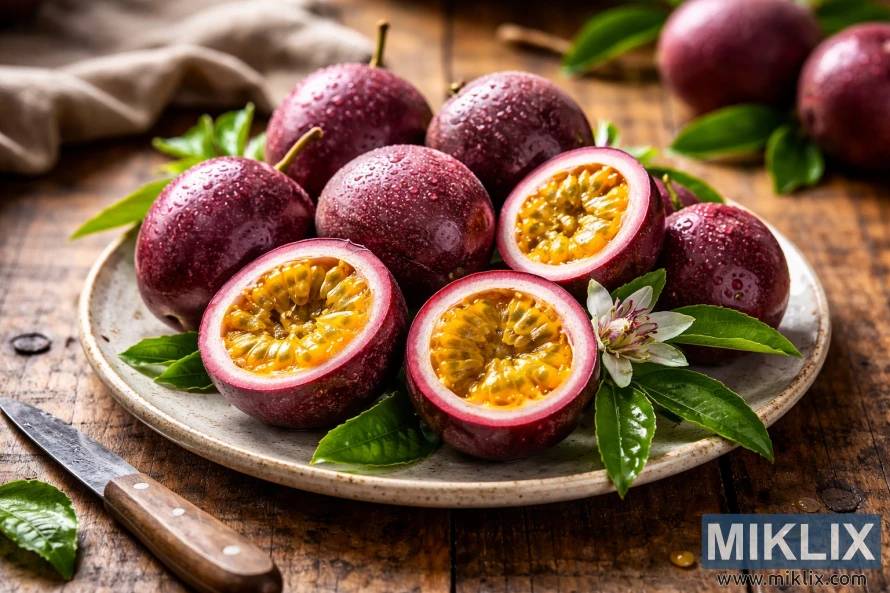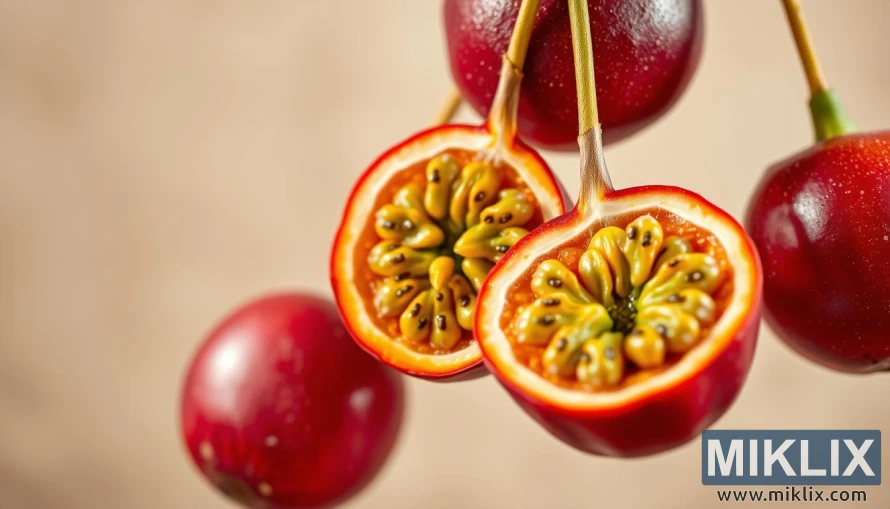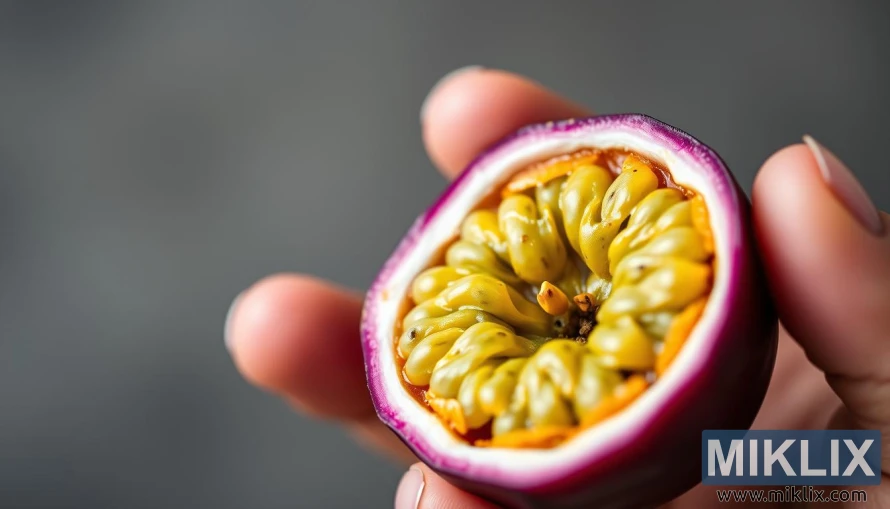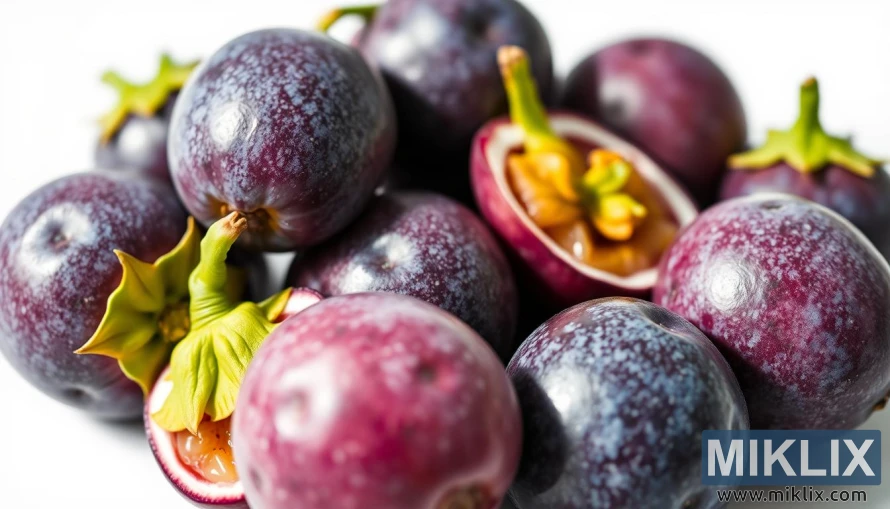The Power of Passion Fruit: A Superfood for Mind and Body
Published: May 22, 2025 at 8:44:47 AM UTC
Last updated: December 23, 2025 at 10:44:46 AM UTC
Passion fruits are known for their bright flavor and special smell. They are more than just a tasty treat; they're full of health benefits. This tropical fruit is loaded with vitamins, minerals, and antioxidants, making it a nutritional powerhouse. As we explore the health perks of passion fruits, you'll see why they're great for your diet. They add a burst of flavor and nutrition to your meals.

Key Takeaways
- Passion fruits are packed with vitamins and minerals, contributing to overall health.
- The fruit is rich in antioxidants, which help combat oxidative stress.
- High dietary fiber content supports digestive health and regularity.
- Passion fruits may aid in heart health and blood sugar management.
- This tropical fruit is low in calories, making it a healthy snack option.
- Enjoyed fresh, in smoothies, or as a topping, passion fruits are versatile in culinary uses.
Introduction to Passion Fruits
Passion fruit is a fascinating tropical fruit from the Passiflora vine. It thrives in warm places, like South America, India, Australia, and South Africa. The fruit has a hard outer shell that holds a juicy pulp with edible seeds.
Its taste is a mix of citrus and melon, loved by fruit lovers everywhere. This unique flavor makes passion fruit special.
Passion fruit is not just tasty; it's also good for you. It's packed with nutrients, making it a hit in kitchens and restaurants. Its health benefits and exotic taste make it a favorite among many.
Nutritional Profile of Passion Fruits
Passion fruits are packed with nutrients, including vitamins and minerals. They are a good source of vitamin A and vitamin C. These vitamins help keep your skin healthy, support your vision, and boost your immune system.
They also have dietary fiber, which is great for digestion and gut health. This makes passion fruits a nutritious choice.
Passion fruits also have smaller amounts of important minerals. These include:
- Potassium
- Magnesium
- Folate
These minerals help your body function well. Adding passion fruits to your diet can add flavor and key nutrients to your meals.
Health Benefits of Eating Passion Fruits
Eating passion fruits can greatly benefit your health. These fruits are not only tasty but also full of nutrients. They are rich in vitamin C, which boosts your immune system and fights off stress.
Passion fruits also have a lot of fiber. This fiber is great for your digestion. It helps you have regular bowel movements and keeps your gut healthy. Plus, it can help you feel full longer, which can aid in weight management.
Antioxidants in Passion Fruits
Passion fruits are known for their unique taste and high antioxidant levels. Vitamin C is a key antioxidant in these fruits. It helps protect the body from free radicals, which can cause harm.
Free radicals are unstable molecules that can lead to chronic diseases. Passion fruits also contain beta-carotene, another important antioxidant. These antioxidants work together to boost health and make passion fruits a great choice for a healthy diet.

Dietary Fiber and its Benefits
The dietary fiber in passion fruit is great for your health. It helps with digestion, making it key to a balanced diet. Fiber stops constipation and keeps bowel movements regular, which is good for your gut.
Fiber also helps control cholesterol levels. Eating more fiber can lower LDL cholesterol, or "bad" cholesterol. This might lower heart disease risk, making fiber important for heart health.
Many don't get enough fiber, but passion fruit can help. Its unique taste and health benefits make it a great addition to your diet. It supports digestion and helps manage cholesterol.
Passion Fruits and Heart Health
Passion fruit is a tasty addition to a heart-healthy diet. It's packed with potassium, which helps control blood pressure. This can lower the risk of high blood pressure.
Passion fruit also has fiber, which is great for the heart. Fiber helps lower cholesterol levels. This improves heart function and reduces heart disease risks.
Eating passion fruit can make meals more enjoyable and help your heart. It's a simple way to support heart health.

Blood Sugar Management with Passion Fruits
Passion fruits are great for managing blood sugar levels. They have a low glycemic index, which means they don't cause blood sugar to rise quickly. This makes them good for people with diabetes.
The fiber in passion fruits helps slow down how fast glucose is absorbed. This helps keep blood sugar levels stable.
Studies show that passion fruit seeds contain compounds like piceatannol. These compounds can make insulin work better. Better insulin sensitivity is key for managing blood sugar levels. So, adding passion fruits to your diet can be beneficial.
Skin Health Benefits from Passion Fruits
Passion fruits are great for your skin because they're full of antioxidants. These include vitamin C and beta-carotene. They help fight signs of aging like wrinkles and fine lines.
By eating passion fruits often, your skin can look younger and fresher. This is because they help your skin cells grow back faster.
Antioxidants in your diet keep your skin safe from damage. Eating passion fruits regularly keeps your skin moist and bright. Adding this fruit to your meals or snacks can make your skin stronger and more vibrant.
How to Enjoy Passion Fruits
Passion fruit is a delightful treat that can make any meal or snack better. To enjoy it raw, just cut it in half. Then, scoop out the pulp and crunchy seeds. This fresh treat adds a tropical flair to many dishes.
Here are some popular recipes and ways to enjoy passion fruit:
- Add the pulp to smoothies for a vibrant flavor boost.
- Use it as a tangy topping on yogurt or oatmeal.
- Mix the juice into salads for a refreshing dressing.
- Incorporate it into desserts like cakes and tarts for an exotic touch.
- Create tantalizing cocktails using passion fruit juice as a base.
Trying out these different ways to enjoy passion fruit can make your cooking more exciting. It lets you enjoy the unique flavor of this amazing fruit.
Possible Health Risks of Passion Fruits
Passion fruits are tasty and good for you, but they can also pose health risks. Some people might have allergies, like those with latex allergies. This is because there can be cross-reactivity, leading to uncomfortable reactions.
Another concern is the unripe passion fruit. It contains cyanogenic compounds, like cyanogenic glycosides. These can be toxic if eaten in large amounts. So, it's important to only eat ripe passion fruits to avoid health risks.

Passion Fruits: A Low-Calorie Option
Passion fruit is a top choice for those watching their calories. Each fruit has about 17 calories. It's perfect for diets focused on weight management, letting you enjoy without feeling guilty.
Passion fruit is also high in fiber. This helps you feel full longer, making it easier to skip unhealthy snacks. You can enjoy it fresh or blend it into smoothies. It adds flavor and nutrition without extra calories.
Global Availability of Passion Fruits
Passion fruits are gaining popularity for their unique taste and health perks. They grow mainly in tropical areas around the world. This makes them accessible in many places, like South America, South Africa, Australia, and Hawaii.
Each place has its own special types of passion fruits. These varieties show how different the fruit can taste.
In the United States, passion fruits do well in warm places like California and Florida. You can find fresh passion fruits at farmers' markets in these states. But, not every place has fresh passion fruits. This means people often look for dried or frozen passion fruit instead.
Passion Fruits in Culinary Uses
Passion fruit is a wonderful ingredient in many dishes worldwide. It adds a special flavor to both sweet and savory foods. This makes it a favorite among chefs and home cooks.
In Colombia, passion fruit is a key ingredient in desserts, giving them a tropical flavor. Australians love it in pavlova, where its tartness pairs well with sweet meringue. It also makes drinks, sauces, jellies, and ice creams even better.
Adding passion fruit to your recipes brings a burst of flavor. It's great in cocktails or salad dressings. The fruit's aroma not only excites the taste buds but also fits well with many cuisines.
Conclusion
Passion fruit is a nutrient-rich fruit that offers many health benefits. It's packed with antioxidants, vitamins, and fiber. These nutrients boost your immune system, help with digestion, and may even protect your heart.
Adding passion fruit to your diet is easy and fun. You can eat it fresh, blend it into smoothies, or use it as a topping for desserts. Its health perks and tasty flavor make it a great choice for improving your health.
By choosing passion fruit, you make your meals more exciting and healthy. It's a great way to live a healthier lifestyle. So, start enjoying passion fruit and see how it can boost your nutrition!

Further Reading
If you enjoyed this post, you may also like these suggestions:
- Grapes of Health: Small Fruit, Big Impact
- Nature’s Candy: Why Dates Deserve a Spot in Your Diet
- Smart Supplementing: How Leucine Supports Muscle Preservation on a Calorie Cut
